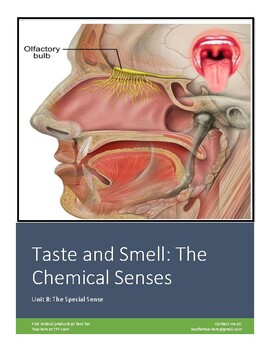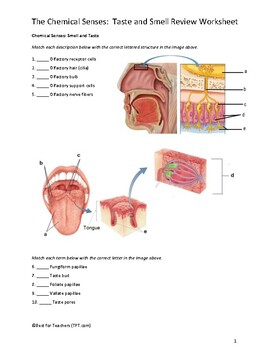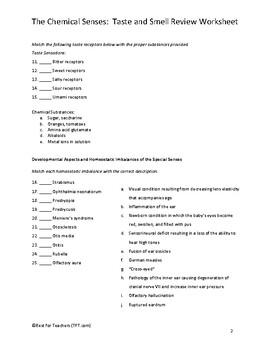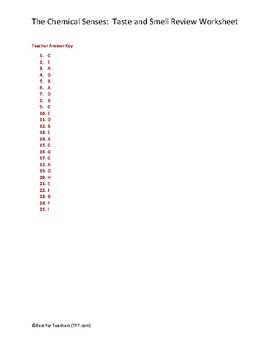Anatomy & Physiology Review Worksheet 8.3: The Chemical Senses: Taste and Smell
- PDF
- Easel Activity
What educators are saying
Also included in
- Make teaching Anatomy & Physiology easy with this Human Anatomy & Physiology Bundle: The Special Senses. Diffentiation and literacy strategies are incorporated and noted in the detailed unit plan. Easily accessable resources (videos, worksheets... are highlighted and linked. Use as an entPrice $11.19Original Price $16.96Save $5.77
- Make teaching Anatomy & Physiology super easy with this highly requested anatomy course growing bundle! SIOP, gifted, and differentiation strategies are embedded and easily identified throughout each unit plan. Lessons are differentiated according to learning style, grouping, and language abilPrice $332.80Original Price $446.97Save $114.17
Description
Make teaching Anatomy & Physiology easy with the Review Worksheet 8.3: The Chemical Senses: Taste and Smell. Questions are in easy to grade format, matching, multiple choice. Use this as an introduction, homework, as a lesson review, or as a formative assessment. Teacher answer key is provided. Easy for teachers to grade, students can answer on their own paper, on a scansheet, or on the worksheet provided.
Materials:
- Student handouts
- Teacher answer key
- Notes or textbook (optional)
Questions are in easy to grade format, matching, multiple choice. Use this as a lesson review or as an introduction to the nervous system. Teacher answer key is provided. Easy for teachers to grade, students can answer on their own paper, on a scansheet, or on the worksheet provided.
Lesson Objectives: This worksheet will help students understand:
- Describe the location, structure, and function of the olfactory and taste receptors.
- Name the five basic taste sensations, and list factors that modify the sense of taste.
For other great resources to make teaching easier follow me for updates! If you like my product, don't forget to write a review! Thank you!
Use this resource alone or get the entire Human Anatomy & Physiology Unit 8 Bundle! The bundle includes:
- Human Anatomy & Physiology Unit Plan 8: The Special Senses
- Human Anatomy & Physiology Review Worksheet 8.1 : Anatomy of the Eye & the Physiology of Vision
- Human Anatomy & Physiology Review Worksheet 8.2: Anatomy of the Ear & the Physiology of Hearing and Balance
- Human Anatomy & Physiology Review Worksheet 8.3: The Chemical Senses: Taste and Smell
- Test: The Special Senses (Free Bonus File)
The Unit Plan
Save time and make teaching easier with this combined unit and daily lesson plan that covers 2 weeks of a secondary H A & P course. SIOP, gifted, and differentiation strategies are embedded and easily identified throuought. Lessons are differnetiated accoding to learning style, grouping, and language ability. Both content and literacy standards as well as key vocabulary words, essential questions, activating strategies, instructional strategies, and summarizing strategies are included and highlighted. Video links are provided! (Please note that video links are active but may requires access to United Streaming and/or that you be logged into your google account)
Upon completion of this unit, students will be able to:
Content Standards:
SAP3: Students will assess the integration and coordination of body functions and their dependence on the endocrine and nervous systems to regulate physiological activities..
- Interpret interactions among hormones, senses, and nerves which make possible the coordination of functions of the body.
- Investigate the physiology of electrochemical impulses and neural integration and trace the pathway of an impulse, relating biochemical changes involved in the conduction of the impulse.
- Describe how the body perceives internal and external stimuli and responds to maintain a stable internal environment, as it relates to biofeedback.
Literacy Standards:
- L11-12RST2: Determine the central ideas of conclusions of a text; summarize complex concepts, processes, or information presented in a text by paragraphing them in simpler but still accurate terms.
- L11-12RST3: Follow precisely a complex multistep procedure when carrying out experiments…
Content Objectives (TSWBAT):
- When provided with a model or diagram, identify the accessory eye structures, and list the functions of each.
- Name the layers of the wall of the eye, and indicate the major function of each.
- Explain how the functions of rods and cones differ.
- Define blind spot, cataract, and glaucoma.
- Trace the pathway of light through the eye to the retina.
- Discuss the importance of ophthalmoscopic examination.
- Describe image formation on the retina.
- Define accommodation, astigmatism, emmetropia, hyperopia, myopia, and refraction.
- Trace the visual pathway to the visual cortex.
- Discuss the importance of convergence and pupillary reflexes.
- Identify the structures of the external, middle, and internal ear, and list the functions of each.
- Distinguish between static and dynamic equilibrium.
- Describe how the equilibrium organs help maintain balance.
- Explain the function of the spiral organ of Corti in hearing.
- Define sensorineural deafness and conductive deafness, and list possible causes of each.
- Explain how a person is able of localize the source of a sound.
- Describe the location, structure, and function of the olfactory and taste receptors.
- Name the five basic taste sensations, and list factors that modify the sense of taste.
Language Objectives:
- Discuss the importance of ophthalmoscopic examination.
- Read clinical cases of homeostatic imbalances of the special senses.
- Write, discuss, and use key vocabulary appropriately.
Key Vocabulary: special senses, special sense receptors, accessory structures, eye-lids, medial commissure (canthus), lateral commissure, eyelashes, tarsal glands, conjunctiva, conjunctivitis, pinkeye, lacrimal apparatus, lacrimal glands, lacrimal canaliculi, nasolacrimal duct, lysosome, extrinsic eye muscles, eyeball, fibrous layer, sclera, cornea, vascular layer, choroid, ciliary body, ciliary zonule, iris, pupil, sensory layer, retina, pigmented layer, neural layer, rods, cones, photoreceptors, bipolar cells, ganglion cells, optic nerve, optic disc, blind spot, night blindness, fovea centralis, visual acuity, color blindness, rhodopsin, opsin, retinal, lens, cataracts, aqueous humor, vitreous humor, vitreous body, scleral venous sinus, canal of Schlemm, glaucoma, fundus, refracted, accommodation, real image, optic chaisma, optic tracts, optic radiation, emmetropia, myopia, hyperopia, astigmatism, convergence, photopupillary reflex, accommodation pupillary reflex, mechananoreceptors, external ear, outer ear, auricle, pinna, external acoustic meatus, ceruminous glands, cerumen, earwax, tympanic membrane, eardrum, middle ear cavity, tympanic cavity, oval window, pharyngotympanic, auditory tube, otitis media, ossicles, hammer (malleus), anvil (incus), stirrup (stapes), bony labyrinth (osseous labyrinth), cochlea, vestibule, semicircular canals, peilymph, membranous labyrinth, endolymph, vestibular apparatus, maculae, static equilibrium, otolighic membrane, otoliths, vestibulary nerve, dynamic equilibrium, crista ampullaris, cupula, cochlear duct, spiral organ of Corti, hair cells, basilar membrane, tectorial membrane, cochlear nerve, deafness, conduction deafness, otosclerosis, sensorineural deafness, Menjere’s syndrome, vertigo, chemoreceptors, olfactory receptors, olfactory receptor cells, olfactory hairs, olfactory filaments, olfactory nerve, anosmias, olfactory auras (olfactory hallucinations), taste buds, papillae, vallate papillae, circumvallate papillae, fungiform papillae, foliate papillae, gustatory cells, gustatory hairs, taste pore, facial nerve (VII), glossopharyngeal nerve, vagus nerve, basal cells, strabismus, ophthalmia neonatorum, presbyopia, presbycusis, ostosclerosis
I would love to hear from you! I am in the process of uploading related resources. Look for the entire Human Anatomy Course Unit set as they become available soon! If there is anything you would like to see prioritized, please let me know! If you like my product, don't forget to write a review!
Than you for shopping Best for Teachers!
Check out my EXERCISE AND NUTRITOIN PLANS FOR TEACHERS ON TPT OR VISIT MY WEBSITE AT REVERSAGE HEALTH & FITNESS! Download my free 1 Week sample Vegetarian Meal Plan for a summer jumpstart weight loss cleanse!I








